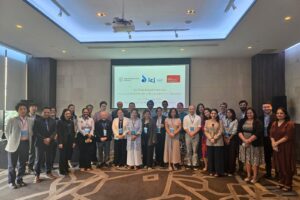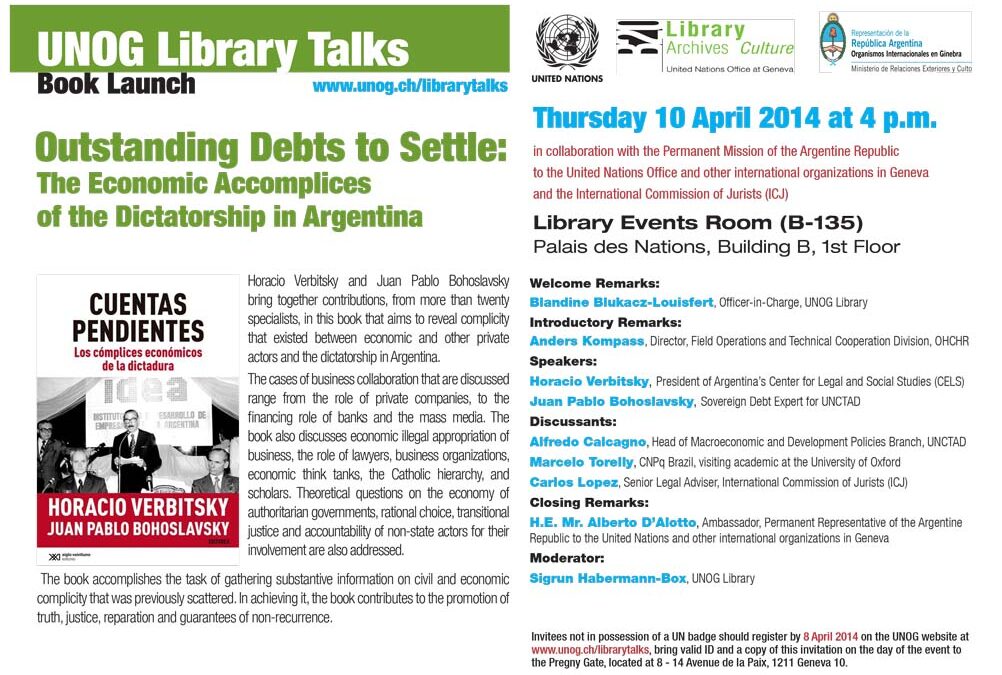
Apr 7, 2014 | Events, News
This is the English title of a book by Horacio Verbitsky and Juan Pablo Bohoslavsky, with contributions from more than twenty specialists, which reveals complicity between private actors and the dictatorship in Argentina.
The book will be launched on 10 April at 4 pm (16.00)in the Library Events Room (B-135) at the Palais des Nations, Building B, 1st floor, in Geneva.
Carlos Lopez, ICJ Senior Legal Adviser on Business and Human Rights will be among the discussants at the event. He contributed one chapter of the book, on corporate complicity.
The cases of business collaboration discussed in the book range from the role of private companies, to the financing role of the banks and the mass media.
The book also discusses economic illegal appropriation of business, the role of lawyers, business organizations, economic think tanks, the Catholic hierarchy, and scholars.
UNOG-launch book corporate complicity in Argentina-news-events-2014 (full invitation in pdf or you can also enlarge the picture)
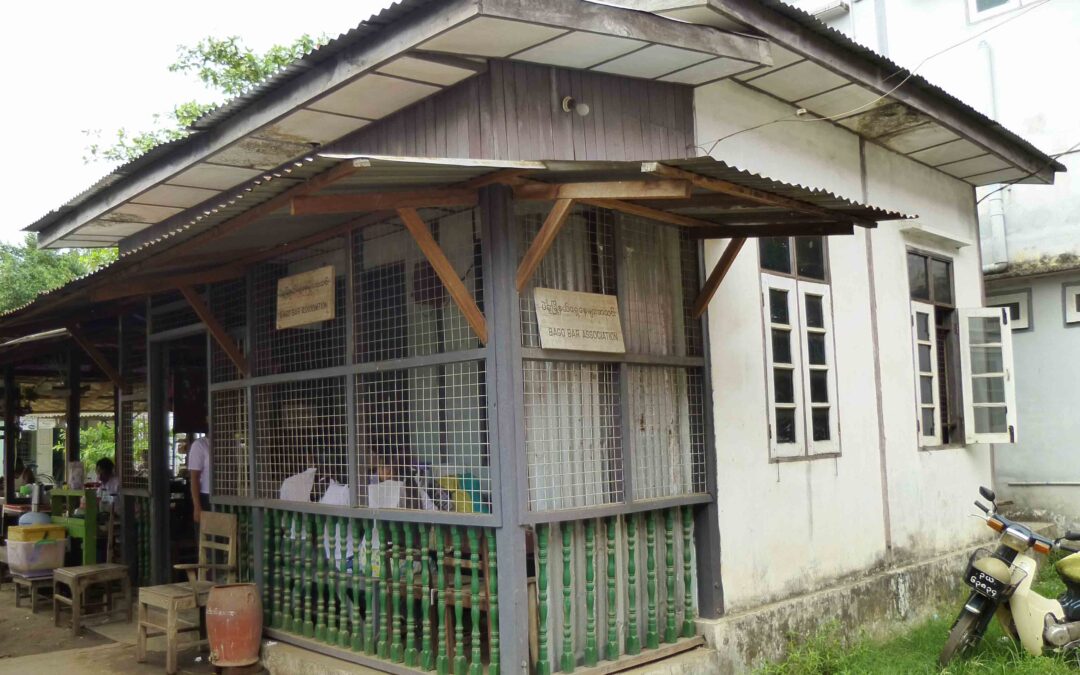
Mar 10, 2014 | Agendas, Events
This side event to the 25th Human Rights Council session will take place on Wednesday, 12 March 2014, 16.00 – 18.00 pm, in Geneva, Palais des Nations, Room XXII.
The members of this panel are in a unique position to highlight on-going challenges to the rule of law in Myanmar and their impact on the enjoyment of human rights.
They will provide personal insight into the important international presence for human rights monitoring, practical challenges facing lawyers concerning the rule of law, and link these issues to sustainable economic development on the ground in Myanmar today.
This panel argues that it is crucial to maintain a robust engagement with the UN human rights mechanisms in order to support and facilitate the reform process in Myanmar and improve the country’s human rights situation.
Speakers:
Tomás Ojea Quintana, UN Special Rapporteur on the situation of human rights in Myanmar
Kyaw Min San, Myanmar lawyer, Pyoe Pin and Justice For All
Daniel Aguirre, International Commission of Jurists, Myanmar
Chair/moderator:
Carlos Lopez, International Commission of Jurists
The presentations by panellists will be followed by an open interaction with the audience. Copies of the recent ICJ report Right to Counsel: The Independence of Lawyers in Myanmar will be available.
Myanmar – HRC25 Side event – March 2014
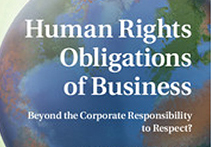
Nov 25, 2013 | Agendas, Events
This is the title of a book to be launched on Monday 2 December at the UN in Geneva, in partnership with the Permanent Mission of Ecuador, and the ICJ.
Do the ‘Respect, Protect, and Remedy Framework and the Guiding Principles on Business and Human Rights adequately address the challenges concerning the human rights obligations of business?
This book engages critically with these important developments. The chapters in the book revolve around four key issues: the process and methodology adopted; the source and justification of corporate human rights obligations; the nature and extent of such obligations; and the implementation and enforcement thereof.
In addition to highlighting several shortcomings of the Framework and the Guiding Principles, the contributing authors also outline a vision for the twenty first century in which companies have obligations to society that go beyond the responsibility to respect human rights.
Ian Seiderman, ICJ’s Legal and Policy Director, will be one of the discussants.
Invitation UNOG Business-event-2013 (full text in pdf)

Nov 7, 2013 | Events, News
The ICJ addressed the 15th Meeting of the European Network of Contact Points for investigation and prosecution of genocide, crimes against humanity and war crimes.
The meeting, which took place in the Hague, had a focus on criminal responsibility of corporations and business persons for serious international crimes and congregated a number of European public prosecutors and investigators.
In its presentation, Carlos Lopez, Senior Legal Adviser at ICJ, addressed ways to overcome difficulties in prosecuting business corporations.
He focused on three cases that are among the ones most advanced in the investigation and prosecution stage of business corporations for crimes under international law: the Riwal/Lima Holding, the Amesys and the Lundin Petroleum cases.
They illustrate the acute dilemmas that public prosecutors are likely to face in these kind of cases and how difficult to solve them it may be.
The full ICJ presentation and the agenda of the meeting can be downloaded in pdf format below.
The Hague Meeting-Prosecuting corporations-Presentation-analysis brief-2013
The Hague Meeting-Prosecuting corporations-Agenda-2013
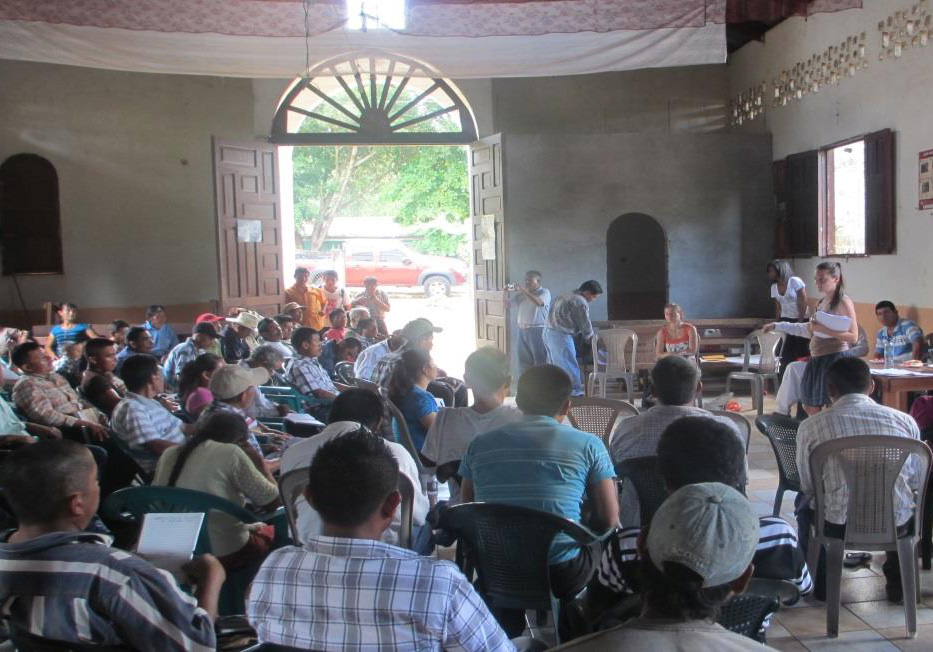
Oct 24, 2013 | News
Los días 22, 23 y 24 de octubre se reunieron en el Departamento de Petén diferentes comunidades, dirigentes comunitarios, defensores de derechos humanos y organizaciones sociales.
El objetivo de la reunion fue evaluar la situación de las comunidades que viven en los municipios de San Andrés y La Libertad, de dicho departamento.
Entre otras organizaciones y dirigentes del departamento de Petén, estuvieron presentes las organizaciones Unión Verapacense de Organizaciones Campesinas (UVOC) y el Comité de Desarrollo Campesino (CODECA), ambas integrantes de la Coordinadora Nacional de Organizaciones Campesinas (CNOC); dirigentes del Frente de Resistencia en Defensa de los Recursos Naturales y Derechos de los Pueblos (FRENA) del Departamento de San Marcos y dirigentes de la Sociedad Civil de Santa Cruz Barillas del Departamento de Huehuetenango; representantes del Bufete de Derechos Humanos (BDH), representantes de El Observador y de la Oficina de la Comisión Internacional de Juristas (CIJ) para Centroamérica.
Después de realizar varios talleres, reuniones, análisis y reflexión sobre la situación de derechos humanos en dichos municipios, las organizaciones mencionadas pudieron constatar que continúa la política de persecución, represión y hostigamiento en contra de las comunidades y de sus dirigentes y pobladores, por el hecho de que sus comunidades quedaron en áreas declaradas “protegidas” en la década de los años noventa.
Muchos dirigentes están sufriendo amenazas por parte de las autoridades estatales, mientras el Ejército de Guatemala mantiene diferentes “retenes” que sirven para amedrentar a las poblaciones y a sus dirigentes y para evitar que trasladen alimentos y medicinas a sus comunidades.
El Concejo Nacional de Áreas Protegidas (CONAP) pretende obligar a las comunidades que viven en zonas protegidas a firmar “Acuerdos de Cooperación”, que resultan lesivos a sus intereses y que no otorgan seguridad jurídica sobre la propiedad y posesión de sus tierras. Al resistirse a firmar dichos acuerdos, representantes de CONAP amenazan a las comunidades y a sus dirigentes con implementar desalojos forzosos en su contra y en contra de sus comunidades.
Esta actitud contrasta con la política gubernamental hacia la compañía petrolera PERENCO, a la cual durante la gestión del ex Presidente Álvaro Colom, se le prorrogó el contrato petrolero por 15 años más a partir del año 2010, aún en contra de preceptos constitucionales e internacionales. Además, recientemente el Gobierno concesionó seis licencias más de exploración petrolera, algunas en áreas protegidas, a favor de diferentes empresas privadas en los Departamentos de Petén, Quiché, Huehuetenango e Izabal.
El Departamento de Petén es uno de los más afectados por las políticas de desalojos forzosos del Estado de Guatemala.
Guatemala-NOTA INFORMATIVA PETEN-web story-2013-spa (full text in Spanish, pdf)






